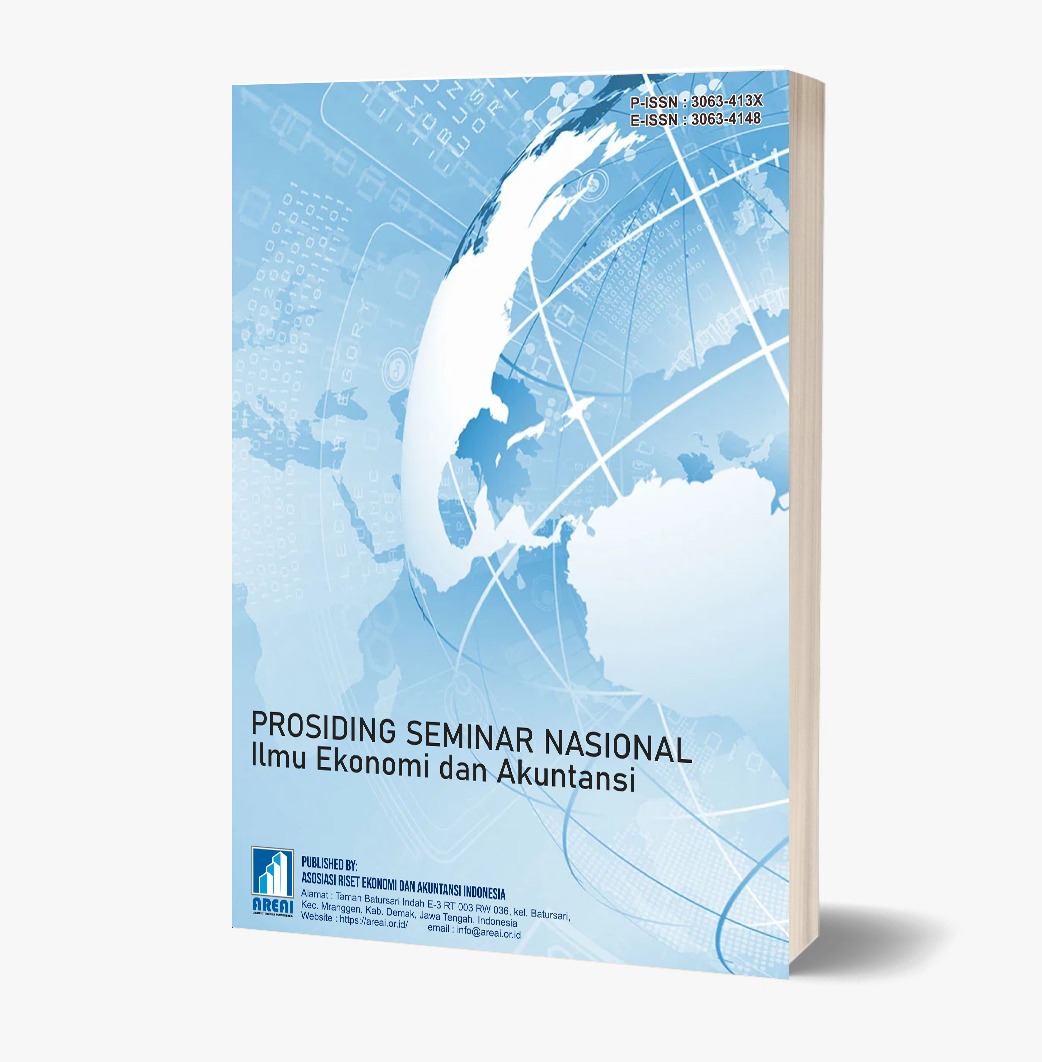Edukasi Konsep Bank Sampah dan Uang Beredar Kepada Pekerja di Bank Sampah Berkah Kecamatan Medan Belawan
DOI:
https://doi.org/10.62951/prosemnasieda.v2i1.114Keywords:
Waste-Bank, Green-Economy, Money-in-Circulation, Medan-BelawanAbstract
The purpose of this community service is to educate the concept of Waste Bank, Green Economy, and Circulating Money to the community in Medan Belawan District. The specific target in this community service is that the Berkah Waste Bank workers in Medan Belawan Subdistrict know what Waste Bank, Green Economy, and Money Circulating to the Community in Medan Belawan Subdistrict, how to apply them to become household income opportunities, for example by becoming a new source of income from saving household waste that has been applied so that they can read the economic and environmental problems that occur. The materials presented in this community service are: what is a Waste Bank, Green Economy, and Circulating Money, how the impact of the Waste Bank on income from household waste. Which is related to improving household welfare through community knowledge / understanding related to Waste Bank, Green Economy, and Circulating Money. From this community service, the results show that with the existence of the Waste Bank, the application of the Green Economy concept can be seen from the collection of household waste easily collected at the Waste Bank, the community becomes a customer, has savings, withdraws money, then continues consumption shopping from the money, which means there is buying and selling activity in the market because there is money circulating in the community. This affects economic activity in the Medan Belawan sub-district.
Downloads
References
Chris Greenwood, et al. (2012). Heart of Borneo, a natural priority for a green economy. WWF.
Corbin, J., & Strauss, A. (2008). Basics of qualitative research: Techniques and procedures for developing grounded theory (3rd ed.). Sage.
Creswell, J. W. (1998). Qualitative inquiry and research design. Sage Publications, Inc.
Dan Duran, et al. (2015). The components of sustainable development - A possible approach. Procedia Economics and Finance, 26, 806–811.
Dinas Lingkungan Hidup dan Kebersihan. (2018). Apa itu Bank Sampah? https://dislhk.badungkab.go.id/artikel/17844-apa-itu-bank-sampah
Efendi, B. (2019). Efektivitas kebijakan makroprudensial terhadap stabilitas sistem keuangan di Indonesia. JEpa, 4(2), 72–78.
Fikriyyah, D. F., & Adiwibowo, S. (2018). Pengaruh bank sampah terhadap perilaku pengelolaan sampah rumah tangga dan pendapatan nasabah. Jurnal Sains Komunikasi dan Pengembangan Masyarakat (JSKPM), 2(6), 703–716.
Hidayat, A. (2022). Pertanian hijau: 'No evidence, hoax'. Kompas.id. https://www.kompas.id/baca/artikel-opini/2022/03/14/pertanian-hijau-no-evidence-hoax
International Institute of Sustainable Development. (2012). Sustainable development timeline. International Institute of Sustainable Development.
Investor.com. (2021, November 2). Peta jalan Indonesia capai net zero emission pada 2060.
Kementerian Lingkungan Hidup Republik Indonesia. (2011). Diskusi bulanan KLH dan SIEJ dalam rangka Hari Peduli Sampah. http://www.menlh.go.id/diskusi-bulanan-klh-dan-siej-dalam-rangkahari-peduli-sampah/
Kementerian Lingkungan Hidup Republik Indonesia. (2013). Profil Bank Sampah Indonesia 2013. http://www.menlh.go.id/profil-bank-sampah-indonesia-2013/
Loiseau, L., et al. (2016). Green economy and related concepts: An overview. Journal of Cleaner Production, 139, 361–371.
Nasution, L. N., Suhendi, S., Rusiadi, R., Rangkuty, D. M., & Abdiyanto, A. (2022). Covid-19 pandemic: Impact on economic stability in 8-EM Muslim countries. Atestasi: Jurnal Ilmiah Akuntansi, 5(1).
Partnership for Action on Green Economy. (2016). Integrated planning & sustainable development: Challenges and opportunities synthesis report.
Pemerintah Kota Medan. (2023). Bank sampah diharapkan tingkatkan penerapan konversi sampah jadi pendapatan. https://portal.medan.go.id/berita/bank-sampah-diharapkan-tingkatkan-penerapan-konversi-sampah-jadi-pendapatan__read2881.html
Rangkuty, D. M., & Hidayat, M. (2021). Does foreign debt have an impact on Indonesia's foreign exchange reserves? Ekuilibrium: Jurnal Ilmiah Bidang Ilmu Ekonomi, 16(1), 85–93.
Rangkuty, D. M., Naibaho, Y. B., & Suhut, A. (2024). Rubbish bank, resources, and the velocity of money at Medan Belawan sub-district. International Journal of Economics and Management Sciences, 1(3), 338–351.
Rusiadi, R., Ulfa, F., Efendi, B., & Rangkuty, D. M. (2024, January). The role of energy consumption in green business and green economies in 5Go-Green countries. In Proceeding of International Conference on Education, Society and Humanity (Vol. 2, No. 1, pp. 370–378).
Salsabila, A., et al. (2021). Program bank sampah sebagai upaya peningkatan kesadaran masyarakat di lingkungan Cipadu Jaya (Studi kasus masyarakat RW 03). Proceedings UIN Sunan Gunung Djati Bandung, 1(17).
Sari, W. I., Nasution, L. N., & Novalina, A. (2021). Analisis leading indicator kebijakan moneter dalam mengatasi kemiskinan di 5 negara Asia Tenggara. JEpa, 6(2), 610–618.
Sekolah Keluarga Universal. (2020). Bank Sampah. https://sku.sch.id/bank-sampah/
Septiani, R. P. (2022). Bank Sampah Asoka dalam peningkatan pendapatan masyarakat Cluster Ixora. Jurnal Akuntansi, 2(1), 29–38.
Suhendi, S. (2023, May). The influence of the internal control system on merchandise inventory at PT Mitra Adi Aktif Perkasa Tbk. In Proceeding International Seminar of Islamic Studies (pp. 1960–1972).
Undang-Undang Republik Indonesia Nomor 18 Tahun 2008 tentang Pengelolaan Sampah. (2008). Jakarta: Presiden Republik Indonesia.
UNEP. (2012). Green economy: What do we mean by green economy? UNEP.
Wartaekonomi.co.id. (2021). Wujudkan Indonesia net zero emission 2060, pemerintah sebut swasta miliki peran penting. https://wartaekonomi.co.id/read380460/wujudkan-indonesia-net-zero-emission-2060-pemerintah-sebut-swasta-miliki-peran-penting
Wulandari, F. (2014). Evaluasi prospek keberlanjutan pengelolaan sampah di bank sampah: Studi kasus bank sampah di Kota Makassar [Tesis, Universitas Gadjah Mada].
Yusuf, M., & Ichsan, R. N. (2019). Analisis efektivitas penggunaan cadangan devisa, utang luar negeri dan ekspor terhadap stabilitas nilai tukar. Jurnal Penelitian Pendidikan Sosial Humaniora, 4(2), 544–561.







